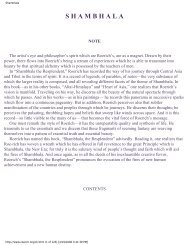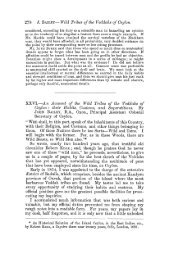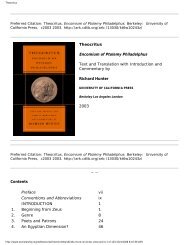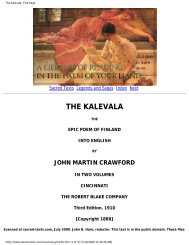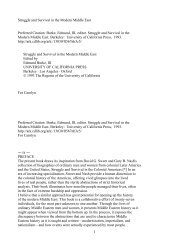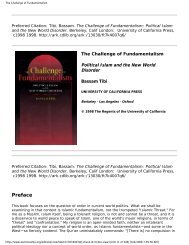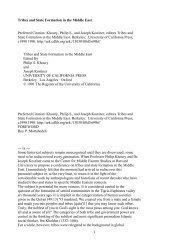Between Two Worlds Kafadar.pdf
Between Two Worlds Kafadar.pdf
Between Two Worlds Kafadar.pdf
Create successful ePaper yourself
Turn your PDF publications into a flip-book with our unique Google optimized e-Paper software.
should a fortiori reflect an earlier memory."[110]<br />
― 99 ―<br />
In this version, then, Ottoman historiography, if not all Ottoman cultural<br />
history, is reduced to the evolution of "state ideology." The early Ottomans<br />
adopted "tribalism," which possibly converged with shamanism parading as Islam.<br />
Then came learned Muslims from the East, who convinced the rulers of the<br />
suitability of orthodox Islam and of the gaza ideology, thus erasing the<br />
memories of the "tribalist" past. By the end of the fifteenth century, court<br />
histories were commissioned to glorify the founders of the state as gazis (who<br />
they never were).[111] Due to accidents or sloppy editing, however, some<br />
remnants of earlier and truer memories crept into these accounts. And those are<br />
the only parts of late-fifteenth-century chronicles that can be assumed to<br />
reflect early Ottoman realities.<br />
The specific image Lindner chooses for Ottoman historiography is that of an<br />
onion. The core of the onion in his account is Osman's "tribalism." Layer upon<br />
layer has accumulated to conceal this core so that by the end of the fifteenth<br />
century, we are faced with a fully ripened onion. Accidents, mistakes, and<br />
crudities give us glimpses of the earlier, deeper layers, however. Such an<br />
accident, for instance, was Apz's illness as a very young man that confined him<br />
to the home of Yahsi Fakih , the son of Orhan's imam. Apz states that during<br />
that sojourn at Yahsi Fakih's house, he saw some menakib written by the latter;<br />
these tales he incorporated into his history.<br />
For a long time, it was believed that the traditions Apz received from Yahsi<br />
Fakih must be sought in those passages of his chronicle that are common to other<br />
chronicles. V. L. Ménage, whose exemplary studies are the building blocks of all<br />
discussion on early Ottoman historiography, has demonstrated, however, that<br />
Yahsi Fakih's menakib must rather be traced to the sections that are unique to<br />
Apz.[112] On this basis, Lindner argues that those unique passages in Apz<br />
"represent a layer of the Ottoman historiographical onion considerably closer to<br />
the core than the other versions."[113] Apz is believed to have had accidental<br />
access to some information. When he later sat down to produce his chronicle for<br />
the court, that information was included within his chronicle through his<br />
simple-mindedness or oversight. "Not contaminated by Apz's preferences," those<br />
passages are closer to truth because they are earlier.<br />
It is not necessarily the case, however, that the closer in time a source is to<br />
certain historical events, the more reliable it is, particularly if a policy of<br />
ideological purification is believed to have started in between that source and<br />
those events. If a significant ideological shift occurred during Orhan's reign<br />
with the intention of sanitizing the reality about his ancestors, the<br />
chieftain's imam would be the least trustworthy source for<br />
― 100 ―<br />
recovering that reality. If the attempt at ideological purification was so<br />
successful as to obliterate all alternative accounts, later sources would not be<br />
89




